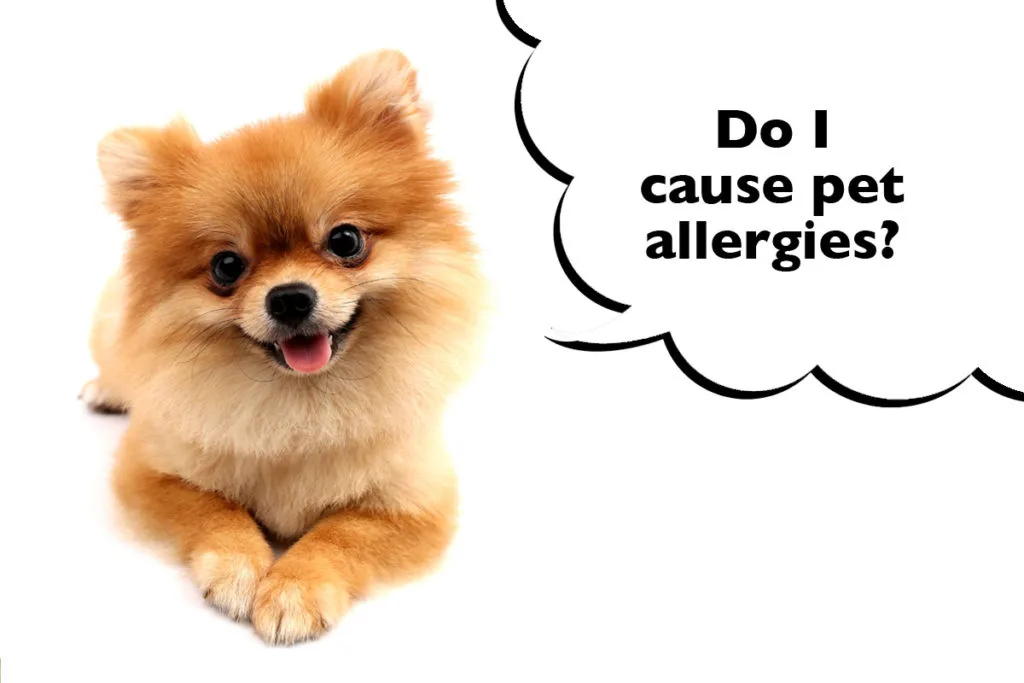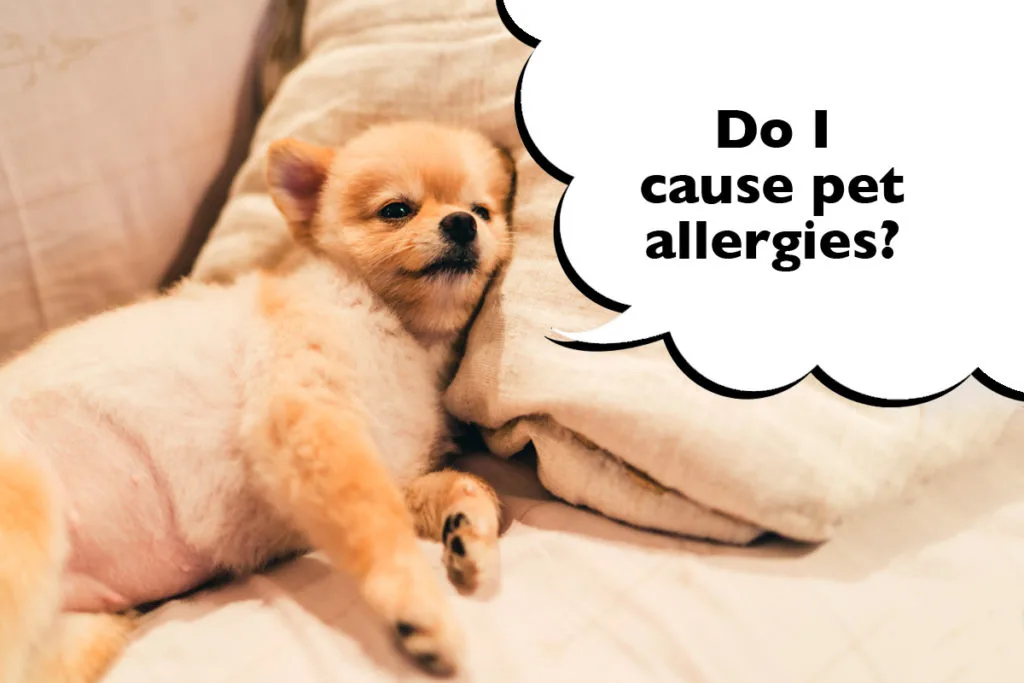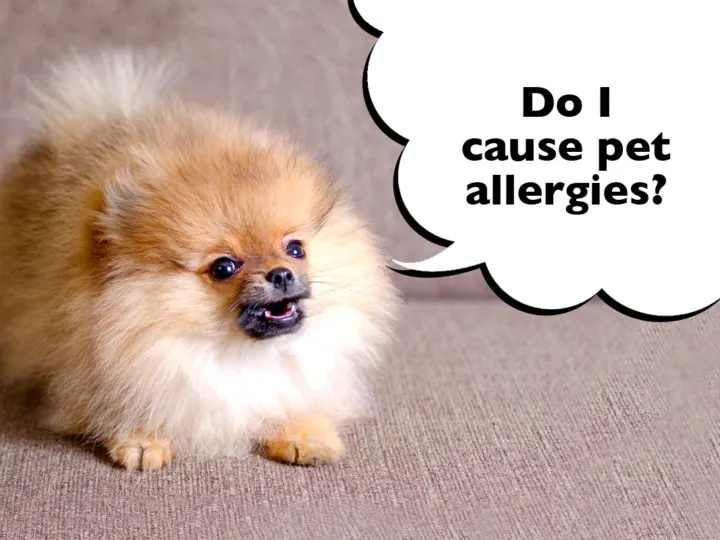Are you thinking of getting a Pomeranian and want to find out if they’re hypoallergenic? Do you have allergies and want to know if a Pomeranian is the right dog breed for you? Here’s everything you need to know about whether Pomeranians and hypoallergenic.
Are Pomeranians Hypoallergenic? No, Pomeranians are not hypoallergenic. In fact, no dog can be considered completely allergen-free! Because Pomeranians have dander attached to their big fluffy coats and shed all year round, they’re not the ideal dog breed for allergy sufferers.
Read on to find out exactly what a hypoallergenic dog breed is, what causes people to be allergic to Pomeranians, and how to keep allergies under control within the home.
Never use the advice in this article as a substitute for professional veterinary advice or treatment. I am NOT a Vet, qualified dog trainer or dog behaviourist. This article is based on research, personal opinion and experience of owning dogs over the last 12+ years.
What Is A Hypoallergenic Dog?
A hypoallergenic dog is one that doesn’t cause any allergic reactions for an allergy sufferer.
Though it’s not possible for any dog to be completely hypoallergenic, there are some breeds that are thought to be more suitable for people with allergies. For example, Poodles, Maltese and Bichon Frise.
However, allergies are very individual to the person so it very much depends on the dog and individual involved.
At the end of the day, there’s no definitive way of knowing for sure if you’ll be allergic to a particular breed of dog, including Pomeranians, unless you spend time with them before bringing them home.
Are Pomeranians Good For Allergy Sufferers?
Unfortunately, Pomeranians are not the best dog breed for allergy sufferers. Due to their small size, they don’t shed a huge volume of hair and dander compared with larger dog breeds, but they do still shed a moderate amount all year round.
They may be ok for people with minimal allergies that are relatively easily managed.
However, they can make conditions like asthma and allergies worse, so it’s important to consider this before you choose to bring one home.
The only way to know for sure if you’re allergic to a certain Pomeranian is to go and spend as much time as possible with them.
What Causes People To Be Allergic To Pomeranians?
There are several reasons why people might be allergic to Pomeranians including:
Dander
Dander is the biggest reason why people would be allergic to Pomeranians. Like all dogs, Pomeranians have dander attached to their fur.
Dander is similar to human dandruff and can be microscopic.
When they shed their coat, this dander is released around your home, which can really get your allergies flaring.
Saliva
Some people can also be allergic to a Pomeranian’s saliva too.
If you let your Pomeranian lick you, it can cause an itchy rash to develop in that area.
In severe cases, even if a Pomeranian licks themselves and then brushes against you, this can also cause an allergic reaction.

Urine and Faeces
Although it’s less common for allergies to be caused by a Pomeranian’s urine or faeces, it can still be a problem for some people.
It’s thought that the proteins found in urine and faeces can be responsible for causing an allergic reaction.
How Do I Know If I Am Allergic To My Pomeranian?
If you suffer from any of the following symptoms then this could mean that you’re allergic to your Pomeranian:
- Sneezing
- Runny or Blocked Nose
- Itchy, Dry or Watering Eyes
- Dry, Tickly Throat
- Coughing
- Wheezing
- Tightness In Your Chest
- Rashes or Itchy Skin
- Breathlessness
All of these symptoms can be more or less severe, depending on the individual dog and person.
Some Pomeranians may cause worse allergic responses than others. But equally, some people’s allergies may be less serious than others too.
What To Do If I Am Allergic To My Pomeranian
Though it’s not possible to stop allergies completely, there are some things you can do to help manage any allergic reactions to your Pomeranian.
Here are some tips that can help keep your allergies under control:
Brush Your Pomeranian Regularly
Most allergic reactions are aggravated by the dander from your Pomeranian’s fur. So regularly brushing can help to keep your allergies under control.
Doing this at least two to three times a week can help to remove as much loose hair as possible.
This reduces the amount your Pomeranian will shed around your home, which in turn reduces the amount of dander in the air too.
Just make sure to brush them in a well-ventilated area, ideally outside or near an open door if that’s possible.
Bathe Your Pomeranian
Bathing your Pomeranian using high quality, natural shampoo and conditioner can also help to keep their skin and coat in good condition.
This should help to reduce the amount of hair they shed, which may help reduce your allergies.
It’s important to not bathe your Pomeranian too often though, once every 6-8 weeks should be enough.
Bathing them too often removes all the natural oils from the skin and coat, which can actually make them shed more!
Don’t Let Your Pomeranian Lick You
The proteins in your Pomeranian’s saliva can cause allergies to flare.
So it’s best to not let your Pomeranian lick you, particularly on your bare skin. This could cause a rash to develop in that area, which may be very itchy and sore.
Feed Your Pomeranian Good Food
Feeding your Pomeranian a high-quality dog food can help keep their skin and coat in tip-top condition. The healthier they are, the less hair they should shed – in theory anyway!
So try to avoid any foods that contain artificial colours, flavours or preservatives.
Pomeranians can be prone to certain food allergies which could increase shedding, so it’s important to feed them the best, most suitable food for them.

Vacuum Your Home Frequently
Vacuuming daily can help to remove any hair and dander that’s around your home.
Concentrate on soft furnishings such as carpets, rugs and sofas as these are magnets for collecting your Pomeranian’s hair!
Vacuums that contain a HEPA filter can be really beneficial for pets as they’re designed to pick up tiny particles of dander that other vacuums may miss.
Dust With A Damp Cloth
Dusting with a damp cloth is a better way to make sure more dust and dander particles are removed.
Damp cloths basically do a better job at trapping the particles onto the cloth itself.
A dry cloth tends to make the dust and dander particles float around in the air, leaving them to settle elsewhere in your home.
Use Air Purifiers In Your Home
Air purifiers help to remove any dust and dander that may be floating around in the air.
They usually contain HEPA filters, just like some vacuum cleaners do, that help to pick up even microscopic particles.
Having an air purifier in multiple rooms around your house, especially the ones your Pomeranian has access to, can help to keep on top of allergy causing dander.
Wash Your Pomeranian’s Bedding Regularly
Washing your Pomeranian’s bedding regularly can help to reduce the amount of hair and dander that collects on it.
It can be a good idea to hoover their bed before you wash it too, to stop your washing machine getting clogged up with dog hair!
Then, run your washer on a hot wash cycle afterwards to remove any hair that may be left behind in the drum.
This can help to stop any hair being transferred onto your own clothes when you wash them.
Don’t Let Your Pomeranian On The Furniture Or Bed
Sofas, chairs and beds are common places for your Pomeranian’s hair to stick to! More hair equals more dander, which can make your allergies worse!
So, it’s best to not let your Pomeranian have access to these places.
If you want to sleep in bed or on the sofa with you, then consider using blankets to cover them. That way you can remove them each day and give them a wash to keep allergies at bay.
Consider Taking Medication
Your doctor may be able to prescribe an appropriate antihistamine medication for you to take.
This doesn’t stop you from having allergies to your Pomeranian, but it can help to lessen the effect of your allergic reaction.
Taking meds may also make it more manageable for you to live with your Pomeranian if your allergies have become more challenging.
So there you have it! Like most dogs, Pomeranians are not hypoallergenic and they shed all year round. They have big fluffy coats meaning they’re not the ideal dog breed for allergy sufferers.
To find out more about how much Pomeranians shed and what you can do to control it, click here!
What do I do next?
Thank you for reading all the way to the end of this article, your support for my blog means everything to me! If you found this article helpful, please kindly share below. Thank you!

